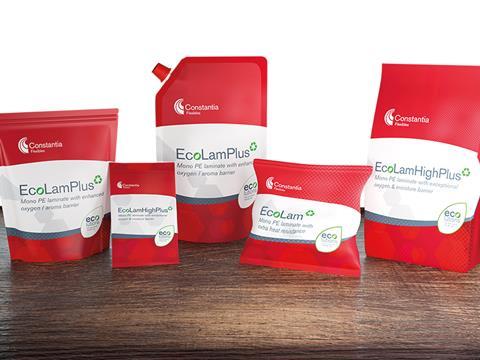
Austrian manufacturer Constantia Flexibles has unveiled a PE film made from 80% recycled content, which uses production waste from its EcoLam laminates.
To make this solution possible, production waste from different EcoLam family laminates, including EVOH (ethylene-vinyl alcohol copolymer), metallization, adhesives, and inks, was shredded and sent for reprocessing.
Partner company EREMA reprocessed this into regranulates on an industrial scale extruder. These regranulates were then converted into a new blown film in Constantia Pirk, which was in turn used in the lamination of new EcoLam materials as a sealant.
Depending on the ink system used, the company says that recycled content of up to 80% in the lamination film was achieved – with only the sealing layer having to be made from virgin material due to its functionality.
According to Constantia, further examinations have shown that the type of adhesive, as well as the type of printing inks used, have a significant influence on the quality of recyclable material.
The company claims to be further investigating whether printed laminates can also be reused in food applications with suitable adhesives and inks. It reports that regranulates from production waste consisting of vacuum metallized films, without adhesives and printing, can even be used in the food contact.
In 2019, Constantia’s EcoLamHighPlus was tested by the RecyClass initiative of European Plastics Recyclers for its recyclability in the existing LDPE (low-density polyethylene) recycling stream. It was reportedly proven that polyethylene laminates with high barrier properties, which were previously only achievable with aluminium laminates, can also be recycled.
"In a circular economy, it is crucial that recyclable packaging laminates can be reused by the laminate manufacturers themselves, as is already the case for many coextruded films, i.e., films consisting of several materials," comments Prof. Dr. Achim Grefenstein, senior vice president of Constantia Flexibles' research and development group.
“The current practice of incinerating or downcycling production waste will then be a thing of the past – an important step towards a more sustainable future.”
















